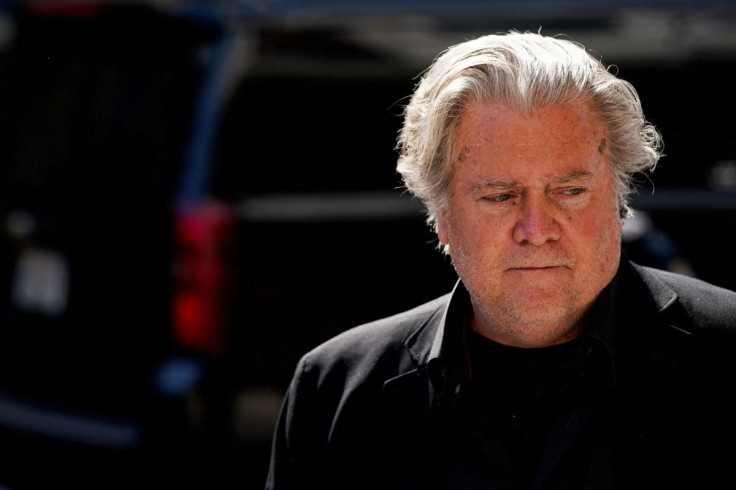Trump Letter Allowed As Evidence In Ex-adviser Bannon's Trial

The judge in Steve Bannon's trial on Wednesday let the defense inform jurors that Donald Trump this month gave the green light for his former presidential adviser to testify before the congressional committee probing last year's U.S. Capitol attack after previously asking him not to cooperate.
U.S. District Judge Carl Nichols made the ruling - a potential boost to Bannon's defense - on the second day of trial testimony in federal court. Bannon, 68, has pleaded not guilty to two misdemeanor counts of contempt of Congress for defying the House of Representatives select committee's subpoena for testimony and documents as part of its inquiry into the Jan. 6, 2021, rampage by Trump supporters.
Kristin Amerling, a senior committee staff member, testified that Bannon disregarded deadlines to respond to its September 2021 subpoena, sought no extensions and offered an invalid rationale for his defiance - a claim by Trump involving a legal doctrine called executive privilege that can keep certain presidential communications confidential.
While Amerling did not specifically address an offer Bannon made this month to testify at a public hearing - a reversal announced shortly before the trial's start date after refusing to do so last year - she told the jury "we always welcome relevant documents and testimony."
During questioning by defense attorney Evan Corcoran, Amerling said that if Bannon is interested in communicating with the committee, then "we would be interested in exploring that further."
Corcoran then asked the judge to let him introduce as evidence Trump's July 9 letter to Bannon offering permission to testify and waiving any executive privilege claim, and question Amerling about it. The judge allowed it but told jurors they cannot consider Bannon's belief about executive privilege as an excuse or consider future offers of compliance as a defense against prior non-compliance.
Nichols also let Corcoran enter into evidence a letter by the committee's Democratic chairman, Bennie Thompson, responding to Bannon's 11th hour offer to testify. Thompson asked Bannon to first produce documents before a deposition could be scheduled.
"Is Chairman Thompson indicating to Steve Bannon that he is open for a deposition at a future date, pursuant to the September 2021 subpoena?" Corcoran asked Amerling, the committee's deputy staff director and general counsel.
"He is indicating he is open to a deposition after Mr. Bannon has produced the requested documents," Amerling replied.
On Tuesday, Corcoran told jurors that Bannon believed the subpoena deadlines were not set in stone and that negotiations between his attorney and the committee would continue.
Trump's supporters stormed the Capitol and attacked police in a failed effort to block formal congressional certification of his 2020 election loss to Democrat Joe Biden. Bannon was a key adviser to Trump's 2016 presidential campaign, then served as his chief White House strategist in 2017.
Amerling said the panel set deadlines requiring an "expeditious response" because it had reason to believe Bannon had relevant information. Amerling said Bannon was identified as one of the people who attended a planning meeting at a Washington hotel the day before the riot.
Prosecutor Amanda Vaughn asked Amerling about Trump's failed bid to block the committee from accessing White House records on executive privilege grounds. The Supreme Court in January rejected Trump's request to block release of records sought by the panel, meaning material held by a federal agency that stores government and historical records could be disclosed even as litigation over the matter continued in lower courts.
Vaughn asked Amerling how long after that decision did Bannon "suddenly" offered to comply.
"About six months?" Vaughn asked.
"Yes," Amerling replied.
The judge warned Corcoran earlier in the day without the jury present: "I do not intend for this to become a political case, a political circus." Nichols made this comment after the prosecution complained about remarks Corcoran made to the jury on Tuesday suggesting the case was politically motivated.
Amerling was the first witness called by the prosecution, starting on Tuesday and resuming on Wednesday. The prosecution then called FBI special agent Stephen Hart, who investigated the circumstances of Bannon's refusal to cooperate. Prosecutors also introduced evidence that one of Bannon's social media accounts last year gloated about his defiance of the subpoena.
© Copyright Thomson Reuters 2024. All rights reserved.





















